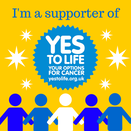
Screening For Cancer
There are 3 aspects to screening for cancer:
- Do I have cancer? – Functional and Conventional testing
- Am I at risk of developing cancer?
- Do I have a genetic predisposition to cancer?
Do I have a cancer/has cancer returned?
Some investigations for cancer require pre-consent. This means you have had an appointment with (or at least spoken to) Dr Sharma to ensure you understand what the results may discover and what that may mean to you.Dr Sharma will fully appraise you of the options for tests which would be most suitable for your concerns. If appropriate to your case, you will be offered an examination – for example, if you are particularly worried about a lump or a bump or some other sign or symptom.
Functional Testing – Early Detection
(Where prices are quoted these include all administration, specimen collection, special couriering when necessary and a written report on the results. We try to keep prices updated but please be aware they are changeable, depending on prices rises from the laboratories and recent Brexit-caused variations. Dr Sharma will be able to quote you the most recent prices during your conversation.)
Research Genetic Cancer Centre Tests - http://www.rgcc-uk.com/Functional
This is a specific blood tests sent to a research centre in Greece that isolates circulating tumour cells & identifies them (£975). In cases of established cancer or if cancer cells are found, further analysis can be performed to test which natural extracts (and chemotherapy) can be used to interfere with the cells. This test is not licensed as a screening investigation and being a pioneering test cannot be considered as such. It has not undergone suitable long term studies as a screening tool and results may not be accepted by conventional doctors. You would need to meet Dr Sharma to provide full consent for this test (£1,550 - £2,420)
Thermography
The UK doesn’t recognise Thermography as a standard investigation although this heat sensitive (thermal) imaging technique is a licensed add-on to more conventional screening in the USA. http://www.functionalhealthscreening.co.uk/functional-health-tests/thermography
(£395 for full body scan, £ 295 for breast scans)
Conventional Testing
| Blood and urine tests | cancer markers and circulating tumour cell counts |
| Stool (faeces) tests for blood or inflammatory markers | bowel cancer screen |
| Cervical smears (for women) | test for cervical cancer |
| Ultrasound | soft tissue examination, such as neck, breast, abdomen pelvis (uterus, ovaries, prostate) |
| X-ray | radiographic imaging of specific areas such as chest |
| Colonoscopy | Bowel |
| MRI or CT scanning | All body parts |
|
Mammography
- The Swiss authorities no longer consider this a suitable first line routine screening process – http://articles.mercola.com/sites/articles/archive/2014/04/30/ mammography-screening-programs.aspx http://www.nejm.org/doi/full/10.1056/NEJMp1401875 |
Breast examination |
Am I at risk of getting cancer?
There are many things that we do within our lifestyle that can put us at risk of developing cancer. These include;- Avoiding tobacco
- Maintaining optimum weight – being overweight is a risk
- Not eating enough fruit and vegetables for their antioxidants, folic acid and other anti-cancer forming nutrients
- Not enough fibre
- Smoked, processed and charred foods
- Drinking excess alcohol
- Certain professions
- Too much or too little sunlight
- Certain infections
- Too little exercise
- Certain medication such as the Pill or HRT
Tests
Tumour Immunity Profile (Blood test)
This test looks at white blood cells involved in defending against cancer. These T cells, including a most important sub-group called NK (natural killer) cells can be measured for number and activity. If low, then you may have a decreased ability to fight cancer.
This test is an option for those who want to know if their defence is functional, for those who have had cancer or for those who have a strong family history of the disease and want to know if they are defending against it well.
It can also be used by those who feel their life style or eating habits may be dragging down their cancer immunity – for example smokers, those not eating their ‘5 a day’, those under exercising etc. (£790)
Nutritional testing including antioxidant and immune activity
Certain nutrients are known to be associated with lower cancer rates and may even be cancer protective such as vitamin E, selenium, Vit C and other antioxidants. Deficiency in these, along with high levels of other nutrients such as L-carnitine, are thought to be associated with an increase risk of cancer.
A simple blood test can highlight problems in these areas and help devise a diet and supplemental program.
Do I have a genetic predisposition to cancer?
This is a question often answered by ‘I really don’t want to know’.BUT this assumes that genes are unalterable and therefore such disease is predetermined and inevitable.
Wrong.
Genomic Testing (Oral swab/Blood test)
Genomics is the analysis of your personal genetic make up and how you might be prone to or how well you might defend against cancer. It is not the conventional gene testing that defines a specific cancer risk, such as that made notorious by Ms Angela Jolie for breast cancer – the BRCA gene (although such testing can be arranged) – but a view of genes associated with cancer that can be altered by life-style and diet.
Protective genes can be ‘switched on’ by specific nutrients such as folic acid found in green vegetables, for example, and potentially adverse genes can be ‘switched off’ by increasing exercise, stopping smoking, or reducing stress Knowing your make up allows for simple changes to reduce your cancer risks.
Various genomic tests can be undertaken such as
| COLOgen | For bowel cancer (£515) |
| FEMgen | To define sensitivity of an individual to hormone sensitive breast cancer (£495) |
| PROSTAgen | For the prostate (£515) |
| Detoxigenomics | Alterations in genes called GST polymorphisms increase the risk of breast, prostate, ovarian, head and neck, basal cell, and melanoma cancers, as well as Hodgkin’s and non-Hodgkin’s lymphomas. Cancer susceptibility is dependent on GST polymorphisms, other detoxification polymorphisms, and total carcinogen exposure. If you are not a genetically good detoxifier you leave yourself open to triggers for cancer but knowing this you may be able to increase the activity of (switch on) the protective genes with life style and diet changes and specific supplements. (£770). |
| Immunogenomics | This general immunity test is geared towards determining tendency to allergy but includes information on TNF alpha which, if over active, can encourage cancer generally. The test also highlights risk of lung cancer. A must do test if you aim at smoking with an ‘it wont happen to me’ attitude. (£294) |
Consultation
Cancer assessment is a broad and complex subject & results can be misinterpreted and should be disclosed and discussed with a full medical explanation, preferably through a consultation with Dr Rajendra Sharma.





